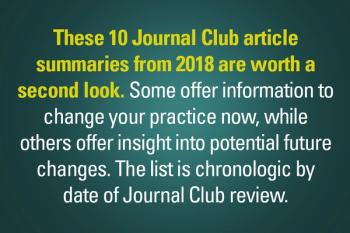
Children who are prescribed montelukast for managing their asthma are nearly twice as likely to experience a neuropsychiatric event as asthmatic children who are taking other asthma maintenance medications.

Children who are prescribed montelukast for managing their asthma are nearly twice as likely to experience a neuropsychiatric event as asthmatic children who are taking other asthma maintenance medications.

Children with asthma who use a web- and mobile–web-based self-management tool show high and sustained self-monitoring and improved asthma outcomes, a study in asthmatic children showed.

Applying sunscreen as often as manufacturers recommend results in plasma concentrations of sunscreen’s 4 active ingredients that exceed the threshold for safety concerns established by the US Food and Drug Administration (FDA), according to a recent study.

Parents who use a web-based educational tool to boost what they know about measuring and managing fever gain significantly more knowledge than parents who follow solely written and verbal instruction, according to a trial in caregivers of children with fever.

A physician incentive program (PIP) that provides primary care providers (PCPs) with bonuses tied to specific goals to decrease pediatric emergency department (ED) use significantly decreases such visits, according to a retrospective analysis involving 1376 PCPs who participated in the PIP.

An evaluation of national and state-level trends in obesity prevalence among 2- to 4-year-old participants in the US Special Supplemental Nutrition Program for Women, Infants, and Children (WIC) found that the changes in the 2009 WIC food packages to better align with dietary guidelines are associated with a decline in the risk of obesity among these children.

Young children whose parents are screened via telephone about their offspring’s development are far more likely to be referred for evaluation and to receive services than children who receive usual care from their primary care provider (PCP), a randomized trial involving 152 youngsters found.

Living in a dwelling that is close to greenspace reduces youngsters’ risk for behaviors associated with neurobehavioral problems. This relationship varies with the type of behavior, the child’s age, and the proximity of the greenspace, according to a study conducted in an ongoing prospective birth cohort.

When parents and children read a book together they have better collaborative experiences when the books are traditional print volumes than when they are tablet-based (electronic) books, according to a recent study in 37 parent-toddler pairs.

Adolescents who initially screened as being at highest risk for alcohol problems on a 2-question screen were more likely than their peers to have more drinking days and be at higher risk for alcohol use disorders at 1, 2, and 3 years after the screen, a large study showed. Participants were 12- to 17-year-olds treated for a non–life-threatening injury, illness, or mental health condition in 1 of 16 pediatric emergency departments.

More providers have been recommending human papillomavirus (HPV) vaccination to their adolescent male patients in recent years, and the effort seems to be paying off: HPV vaccination coverage among boys aged 13 to 17 years increased from 8.3% in 2011 to 57.3% in 2016, while the proportion of providers who recommended the vaccination to this patient group increased from 14.2% to 65.5%.

Children of women who smoke during pregnancy are more likely to have attention-deficit/hyperactivity disorder (ADHD) than children of nonsmoking mothers, according to the first study to investigate the association between smoking and ADHD based on nicotine serum biomarker levels rather than self-reported smoking. Further, the investigation found that as the amount of smoking increases, so does the likelihood of ADHD.

A 1-year randomized trial in 886 adults living in the United Kingdom showed that electronic cigarettes (e-cigarettes) are more effective for smoking cessation than nicotine-replacement therapy.

Children aged 24 and 36 months who spend a lot of time in front of screens do less well on standardized developmental screening tests than other children, a longitudinal group study conducted in Canada showed.

Moderate aerobic exercise seems to be an effective treatment for adolescents after sport-related concussion, according to results of a randomized trial conducted in 103 athletes aged 13 to 18 years who entered the study within 10 days of being injured.

Watching a short training video that addresses provider related barriers to vaccination against human papillomavirus (HPV) corrects common misperceptions about HPV and the vaccine, increases providers’ comfort in counseling vaccine-hesitant parents, and facilitates vaccine completion.

Release of school report cards on a Friday is associated with a significant rise in certified child physical abuse reports the following day, a retrospective study of a single academic year in Florida found.

Whereas rates of screening for adolescent major depressive disorder (MDD) have increased in recent years, they still are insufficient to address the current mental health crisis among adolescents, an analysis of countrywide data for 413,080 12- to 14-year-olds showed.

Many 6- and 12-month-old infants do not yet sleep through the night, but Canadian researchers found no significant associations between this situation and infants’ mental and psychomotor development or their mothers’ mood.

Febrile infants from disadvantaged neighborhoods with high rates of childhood poverty are much more likely than their peers from more affluent neighborhoods to have a bacterial source for their fever, according to a retrospective study of infants aged 90 days or younger with a temperature of 100°F or greater who visited an emergency department (ED) of an urban children’s hospital.

Of 973 preschool-aged children with acute gastroenteritis who visited 1 of 10 geographically diverse pediatric emergency departments (EDs), those who received a 5-day course of Lactobacillus rhamnosus GG, a commonly recommended and used probiotic, did not have better outcomes than those who received placebo, a prospective, randomized trial found.

A survey of more than 700 women who had given birth to at least 1 child found that about one-third of women who were aware that breastfeeding reduces the risk of breast cancer thought this knowledge had contributed to their decision to breastfeed.

A longitudinal study begun when participants were aged 15 years showed that body mass index (BMI) tends to increase more rapidly over time in individuals who experience food insecurity in their early teenaged years than in those who don’t.

Acetaminophen is a safe antipyretic against febrile seizures (FSs) and has the potential to prevent FS recurrence during the same fever episode, a study in Japan found.

A study conducted in Australia found that that the answer to this question is a resounding “no.” A comparison of behavioral outcomes in 124 children who had colic that had resolved by age 6 months (colic group) and 503 infants without problem crying at 1, 4, and 6 months (no colic group) found that the colic group did not manifest any adverse effects related to behavior, regulatory abilities, temperament, or family functioning when they were aged 2 to 3 years.

Infants who are exposed to tobacco smoke during their mothers’ pregnancy or after birth are at increased risk of gastroesophageal reflux (GER), especially of events with bolus movement detected by impedance (GER-imp), according to a French study in 31 neonates referred to a medical center for investigation of suspected GER.

Infants who are breastfed exclusively show less hypothalamic stress response than infants who have been breastfed little or not at all, according to a study in 42 healthy, 5-month-old infants and their mothers.

These 10 Journal Club article summaries from 2018 are worth a second look. Some offer information to change your practice now, while others offer insight into potential future changes.

Frequently sending texts to caregivers with messages about infant development, safety, and basic care reduces the number of visits to the emergency department (ED) in the first year of life, according to a new study conducted in a large urban pediatric care practice that serves a low-income population with limited health literacy.

Women who use marijuana while breastfeeding produce breast milk with a measurable amount of the primary psychoactive ingredient in marijuana, delta-9-tetrahydrocannabinol (delta 9-THC), for up to 6 days since they last smoked. This was the primary finding in a study in 50 breastfeeding women who reported using marijuana and provided breast milk samples to a research repository for analysis.

Published: July 1st 2016 | Updated:

Published: August 1st 2014 | Updated:

Published: November 1st 2017 | Updated:

Published: November 1st 2017 | Updated:

Published: November 1st 2017 | Updated:

Published: December 1st 2017 | Updated: